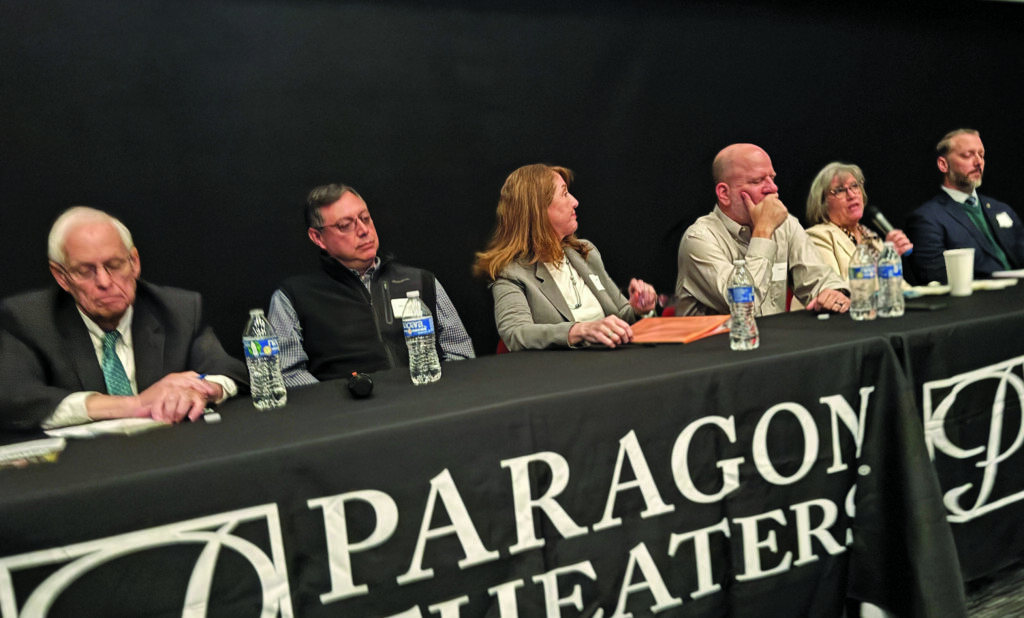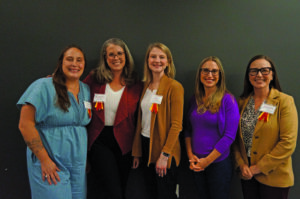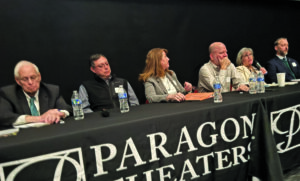
The last Falls Church City Council candidate forum before the upcoming Nov. 4 election was slated to be held last night, after the News-Press’ deadline for this week. It will be reported on next week, the N-Ps final before election day.
But an exemplary face-off was held the day before, this Tuesday, hosted by the Falls Church Chamber of Commerce in the ultra-modern venue of the fanciest screening room of the new Paragon Theaters in downtown F.C.
Chamber members sat in comfy theater chairs where they munched their lunches as the six candidates for Council lined up behind a table far below them, beneath a giant silver screen, and reached their audience with the help of a microphone.
The candidates, seated as facing the audience left to right, were all on hand, incumbent David Snyder, newcomer Brian Pendleton, incumbent Laura Downs, first timer Arthur Agin, incumbent Marybeth Connelly and first timer James Thompson Jr.
The six are competing for four open seats, among seven total, on the Council. On the ballot are also five candidates vying for four seats, among seven total, on the F.C. School Board (they held a debate last week, reported elsewhere in this edition), three statewide offices (governor, attorney general and lieutenant governor), the Virginia House of Delegates for the 13th district (with incumbent Marcus Simon favored over Republican and Libertarian challengers), and three races for Constitutional officers (sheriff, treasurer and commissioner of the revenue) that all feature incumbents running unopposed.
With now just two weeks before the election, the statewide races – Democrat Abigail Spanberger ahead in the polls against Republican Winsome Earle-Sears for governor, Republican John Reid and Democrat Ghazala Hashmi vying for lieutenant governor, Republican Jason Miyares and Democrat Jay Jones competing for attorney general – are heating up with TV airwaves, especially, being choked with ads.
The 13th district State Delegate race here, while incumbent Del. Simon enjoys a major lead against Republican Sylwia Oleksy and Libertarian Dave Crance Jr., is one of 100 around the state, as every delegate district is being contested for control of the body, which is now narrowly in the hands of Democrats.
While the Nov. 4 election day approaches, it is noted that in Falls Church, according to registrar David Bjerke, 1,950 people have already cast ballots, 17.5 percent of the total registered voters here.
In Tuesday’s Council debate before the local Chamber of Commerce, the main dividing line separating the candidates was drawn between those who argued that the current Council is doing a good job, and those who called for change.
The main proponents of the current direction on the Council were two incumbents who have been on the side of most, if not all, majority votes in the last period, Connelly and Downs. The third incumbent, Snyder, who has missed some events this fall recovering from cancer surgery that he reports has been fully successful, has frequently voted against the majority on the Council, so his remarks about the current performance were less than stellar.
The three challengers – Thompson, Pendleton and Agin – all focused on the need for changes to make things better, though Agin, as head of the Citizens Advisory Committee on Transportation (CACT), aligned himself more than the others with the current Council direction.
Pendleton, a member of the Board of Zoning Appeals, proved himself critical of current Council stances on a number of issues, including the current revenue sharing agreement between the Council and School Board. Thompson, who heads the Winter Hill Homeowners Association, a former Marine who is now pursuing a Ph.D. at the Rev. Jerry Falwell’s Liberty University, has been outspoken throughout the campaign calling for a pause on further economic development.
Connelly, as an incumbent and former vice mayor, was the most outspoken in favor of the Council’s achievements, including on economic growth, noting how that growth has led to a 17 cent reduction in the real estate tax rate owed by residents while fostering a vibrant and welcoming commercial corridor and top notch schools.
She was also a major player in the crafting of the revenue sharing agreement between the City Council and School Board, noting that it has smoothed over was had been acrimonious relations in the past and allowed the Council to focus its attention more on its own priorities.
Downs also touted the Council’s recent accomplishments, even though she has been on the Council only a year after winning a special election to fill a vacancy. Before that, however, she served four years on the School Board, herself, two as its chair, and was a major force in the crafting of the revenue sharing agreement while navigating troubled waters during the Covid pandemic.
Pendleton cautioned of a “blind eye” about what has been given to the schools and expressed concern that students are “unprepared” for further education. Crafting his remarks for the Chamber’s business friendly audience. Thompson said claims he is anti-development is “not exactly true,” but still stressed the need for a “pause” in development.
Connelly, noting 20 years working with the schools, 17 years as a member of the Chamber, and 12 years on the Council, said “I am proud of what we have done. We’ve all worked together at this.” Responding to a question about day care, she lauded the 50th anniversary of the F.C. Schools’ Day Care program.
Agin said the F.C. Schools are the “crown jewel” of the City and that he supports the revenue sharing arrangement. He said, in terms of development, “the City has been on a good path so far” but he doesn’t want to see an “urban canyon,” noting that “the issues are in the details.”
Snyder said, “If the schools fail, the City fails,” and “I will never let that happen.” Economic development kicked off in the 1990s, he said, when Alan Brangman was mayor and he was vice mayor.
Pendleton charged the Council has done a “questionable job” with development, noting a problem with encouraging restaurants in mixed use buildings and suggesting the 2010 Arlington shift to encourage more office spaces instead. But Downs countered that there is now a glut in Arlington office space that is a major headache for them.
Downs also attributed commercial development here with the 17 cent tax rate reduction, the construction of a $120 million new high school, and the retention of a AAA bond rating for the City, which she said is “a phenomenal, huge feather in our cap.”
Thompson said that the City needs to hold developers more accountable on affordable housing, and that there should be “no big building” to address the problem.
Downs and Connelly touted the 99 new affordable housing units that the current Council has elicited from developers during the recent growth period.













